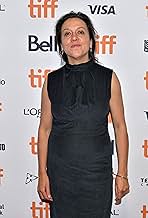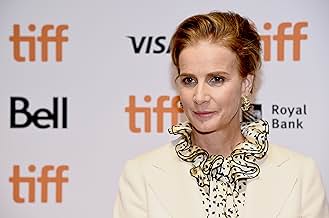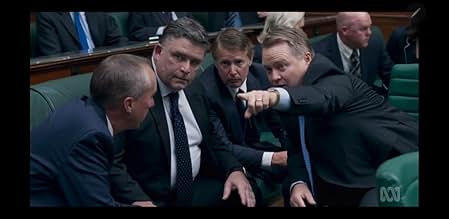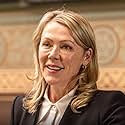Total Control
- Série de TV
- 2019–2024
- 1 h
Uma mulher indígena na Austrália ocupa um lugar central na política.Uma mulher indígena na Austrália ocupa um lugar central na política.Uma mulher indígena na Austrália ocupa um lugar central na política.
- Prêmios
- 6 vitórias e 27 indicações no total
Explorar episódios
Avaliações em destaque
Well, I just watched the final episode, and all I can say is WOW. Well done to the writers, and the overall quality is excellent. I love the use of the old Parliament house chambers. The cast give powerful and emotional performances, particularly Deborah Mailman as Alex Irving, Rachel Griffiths as Rachel Anderson and Harry Richardson as Jonathan Cosgrove. Celia Ireland as Tracey Helliar is really growing into her part. Shantae Barnes Cowan as Jess Clarke is a natural, taking us all with her. Gosh William McInnes as Laurie Martin has come a long way since Sea Change, always brilliant. To all the cast and crew, thanks for this very entertaining series. It will become a classic.
Deborah Mailman seizes our attention from the start and holds it unwaveringly in the first episode and the script writing and camera work back her all the way. The caricature of the 'Canberra bubble' carried by a cast of instantly recognisable and strong actors fitted comfortably into my prejudices while Rob Collins gave a moving performance as the Senator's brother. This series is exciting - almost enough to wipe the lingering aftertaste of "Pine Gap"!
I wasn't quite sure how the story in season 2 would develop, but after just watching the first two episodes, I'd say it's better than season 1. This season feels a little more grounded in reality, with Mailman continuing to excel in the role.
Absolutely riveting. Congratulations to all who have contributed to this gripping series.
I was thinking the first couple of episodes were rather formulaic, not believable and a tad pedestrian. There are some ponderous issues raised, such as how an unknown woman from the bush (and not even a party member) becomes a senator to occupy a casual vacancy. Members who've been going to branch meetings for years will be extremely disappointed by the low entry price Alex had to pay to become a senator.
Another point I had incredible difficulty with was how an aboriginal rights campaigner ends up joining the Liberal/National government. Okay, I'm aware of Neville Bonner and even Ken Wyatt, but I still can't see why Mailman's character - completely upset over lack of indigenous services in the bush - could join the (now) government.
As the episodes proceed, however, and we get to know the characters, the emotional side starts to shine through, and the series massively improves. Not wishing to reveal spolers, I think the main change occurs when Mailman has to race back to her home town to deal with a pressing issue there. That's treated with humour and sensitivity, and humanises the character and the whole series.
Some of the political procedures shown are simply not correct, but perhaps the series can be forgiven for taking shortcuts. However, to a regular watcher of parliament, it grated on me a little about how someone can just stand up in parliament and make a statement or even move a motion without going through the correct procedural processes.
What's interesting is that most of the imagery in parliament house is shot in the new parliament house (Opened in 1987), but when we enter the House of Reps or Senate chamber, we find ourselves down the road at Old Parliament House. I suppose it was a lot easier for the locations manager to book old Parliament House than the new, or indeed for a set to be constructed.
Certainly a worthwhile watch, and I encourage people to not judge this on its first two episodes - it gets a lot better - but far from perfection as some reviewers here would have you believe.
Another point I had incredible difficulty with was how an aboriginal rights campaigner ends up joining the Liberal/National government. Okay, I'm aware of Neville Bonner and even Ken Wyatt, but I still can't see why Mailman's character - completely upset over lack of indigenous services in the bush - could join the (now) government.
As the episodes proceed, however, and we get to know the characters, the emotional side starts to shine through, and the series massively improves. Not wishing to reveal spolers, I think the main change occurs when Mailman has to race back to her home town to deal with a pressing issue there. That's treated with humour and sensitivity, and humanises the character and the whole series.
Some of the political procedures shown are simply not correct, but perhaps the series can be forgiven for taking shortcuts. However, to a regular watcher of parliament, it grated on me a little about how someone can just stand up in parliament and make a statement or even move a motion without going through the correct procedural processes.
What's interesting is that most of the imagery in parliament house is shot in the new parliament house (Opened in 1987), but when we enter the House of Reps or Senate chamber, we find ourselves down the road at Old Parliament House. I suppose it was a lot easier for the locations manager to book old Parliament House than the new, or indeed for a set to be constructed.
Certainly a worthwhile watch, and I encourage people to not judge this on its first two episodes - it gets a lot better - but far from perfection as some reviewers here would have you believe.
Você sabia?
- CuriosidadesOriginally entitled "Black Bitch" but this title was deemed too controversial.
- ConexõesFeatured in The 62nd Annual TV Week Logie Awards (2022)
Principais escolhas
Faça login para avaliar e ver a lista de recomendações personalizadas
- How many seasons does Total Control have?Fornecido pela Alexa
Detalhes
- Data de lançamento
- País de origem
- Idioma
- Também conhecido como
- Полный контроль
- Locações de filme
- Winton, Queensland, Austrália(location)
- Empresas de produção
- Consulte mais créditos da empresa na IMDbPro
Contribua para esta página
Sugerir uma alteração ou adicionar conteúdo ausente




































